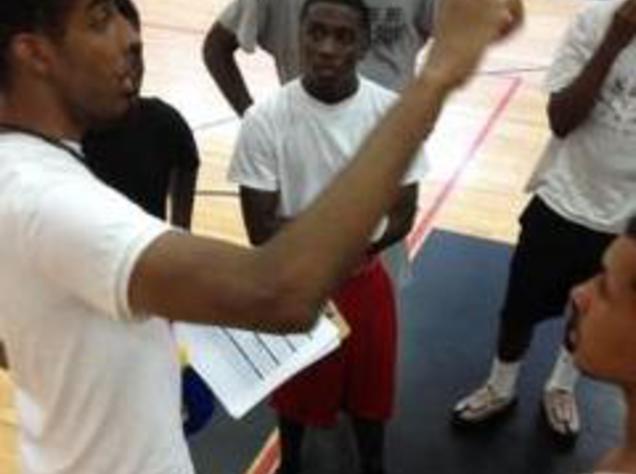Thanks for taking the time to chat, coach. I have a few questions to get us started but we’ll just run with it from there. How does that sound?
That sounds good. Thank you for having me.
No problem. So for the first question, I’m curious: growing up, did you have a private coach yourself?
Unfortunately, I didn’t really have a private coach or a one-on-one coach. It was more like a “village raises the child” type deal. I had a brother-in-law who pushed me which made me want to get better. As I got older, I realized the importance of having a one-on-one-coach and that’s where my passion came from. Once I knew the importance, then I wanted to make sure that other players who were younger than myself had the one-on-one basketball training.
So when exactly did you realize that private coaching was a great opportunity for kids and even older athletes?
I realized it was important when I saw two different AAU teams play against one another. One of the teams had students who had worked with private basketball coaches before and the other team clearly did not. The team with kids who had been privately coached was beating the other team out and it was all regardless of athleticism. I watched tournaments and even high school games, and when one program was more focused on skills than another, you could tell what was up. Those fundamental skills are typically more developed with one-on-one training.
Gotcha. So it sounds like you learned pretty quickly that one-on-one training was the way to go to develop fundamental skills. But since you didn’t have much experience with private training growing up, what was it like learning to coach an individual rather than a team?
Let’s see. When CoachUp came along, I had already learned the craft, so to speak. As soon as I went to college, you could tell which guys were fundamentally sound and which guys simply relied on athleticism. I took what I learned in college and passed it on to young men and women who wanted to get better. I quickly discovered that even the smallest things can be taken for granted in basketball. I couldn’t assume that students knew seemingly simple things like pivots and up-and-under moves. You have to assume that your students are clean slates – molds of clay – and your job is to fix and carve them to what they want to be.
So would you say that a big part of the job requirement is patience? Patience to figure out what level your athlete is at and to really begin to understand what their learning curve is.
Oh absolutely. Patience is paramount. You may have one young athlete that catches on so quickly it’s scary. In another case, you may have a student that takes longer to pick up on things. Patience is something that you need to have because without it, your students may never reach their potential. Without patience, you may move them faster than they’re ready to move. You may discourage them by making them do something they’re not ready to do and they won’t perform as well as they can as a result.
So my next question might be one that you’ve gotten before. It’s a classic one: what do you enjoy most about private coaching?
There are a lot of things that I really like, but it never gets old when you show an athlete something and he or she sees it work. For example, I like to think about something as simple as form shooting. I’ll explain to an athlete that they need to bring their elbow closer to their core. Depending on how young they are, they may be used to shooting with two hands like Superman.
The ever-so-classic, go-to move huh?
[laughs] Exactly. So when I say, “Okay, I need you to make sure that you bring that elbow in!” and they’re like “Ah man, it’s so uncomfortable!” I’ll tell them “I know, I know! Hang in there, hang in there!” and finally they’ll start making [shots]. At that moment, that huge light bulb appears above their heads. When the results start comin’, they’ll want to practice more. So if I had to isolate one thing that I enjoy the most about private coaching, it would be that moment when they begin to understand why they’re doing what they’re doing.
Very well – that’s awesome. What you’re saying makes me think…you sure do offer a lot to your athletes, but do you ever find yourself learning things from them? I think it’s worth thinking about because oftentimes young athletes and their parents expect private coaches to give their all, but surely these coaches can pick up a thing or two along the way.
That’s a very good question. One thing that I’ve learned is that passion never gets old. If your athlete believes that he can do something, then he’ll forget about any incapability. Let’s say you’re coaching a high school team and your tallest person is 5’8”. You’re playing another team and their shortest person is 6’2”. Now – in your head – you’re thinking, “there’s no way we’re gonna win this – nope.” But, if you worry about rebounds and if everybody’s boxing out correctly, then you’ll draw over-the-back calls for that. So, it may be a little cheesy, but anything can be done if you strategize and plan correctly. Where there’s a will there’s a way. It’s a cliché thing, but I really believe that and it’s something I learned from young athletes.
That’s a great answer. I have one last question! In your experience, what has been your favorite outcome of positive coaching? Can you think about a specific instance where someone you coached accomplished something that they were proud of, that made you proud, and maybe even made you laugh?
That’s a tough one cause there have been a lot of great moments. Hm, lemme pull this one out of the hat. I was coaching a high school player and we were working on ball handling skills and dribbling in his garage. I had told him that all you need to practice those skills are a ball and a hard surface. We were dribbling through the legs and practicing scenarios for about an hour until we took a break. There happened to be a broomstick on the ground at the time. Now, he’s leaning against the garage wall with his right hand and he’s holding the ball with his other. While we’re talking, he accidentally dribbles the ball off of the broomstick, and the ball somehow bounces from the broom, to the wall, and right into his left hand. But, the funny thing was that he didn’t look away from one spot the whole time! About three seconds passed and his eyes grew so wide. He screamed, “AHH! Did you see that?! I didn’t even look! Did you see that?” The two of us went to raving about it for ten minutes until we got back to practicing again. To me, that was so awesome. I wish I could have just printed a mental snapshot of it.
[laughs] I think you described it perfectly! You chose a great story, Coach. Now that’s about all I have for you but I just want to finish up by asking you if you have any final things you want to share.
Yea, yea I just want to say two things: one to the coaches and then the other to the players. To the coaches, I want to say that it’s important to give athletes positive reinforcement. If your athlete does something well, make sure you let them know. Of course, if they do something wrong, you should correct it, but if they do something correctly, you cheer like you’ve never cheered before.
For the athletes, my advice to you is work as if someone is sitting in the rear-view mirror at all times. If you want to reach your goals, commit yourself to the training. Whatever sport it may be, commit to it and you will definitely see improvement.
How useful was this post?
Click on a star to rate it!
Average rating 0 / 5. Vote count: 0
No votes so far! Be the first to rate this post.


